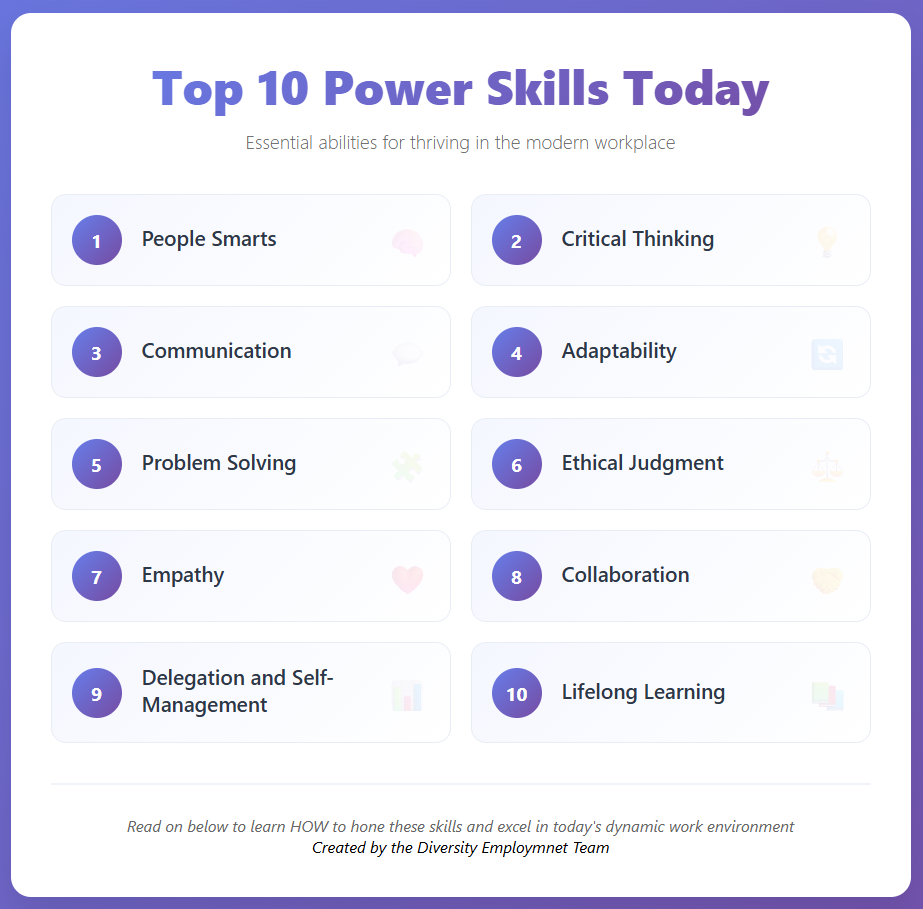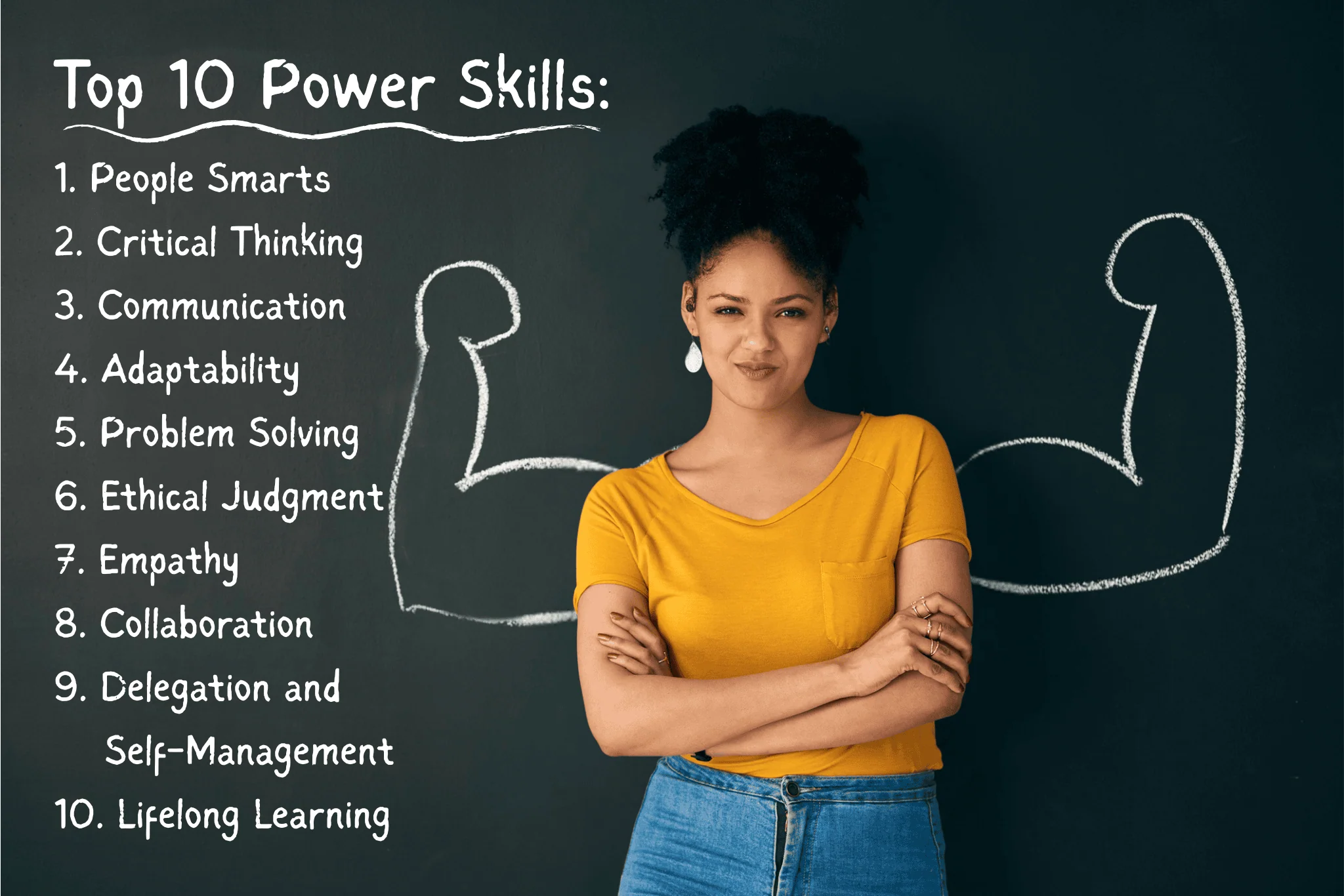AI is here to stay and it’s changing what work is and how we do it. The great Reboot? Maybe. But… For decades, jobs were defined by inflexible roles: job titles, departments, clear boundaries, etc. In an AI-powered economy, skills are becoming the real measure of value. The most forward-thinking companies are already making a big shift: hiring for capabilities, not paper credentials. They’re leveraging AI to automate and to identify, assess, and match talent to work in real time.
According to Fortune reporting from the Brainstorm AI conference in Singapore, major companies, including a Southeast Asian bank and Workday, are pioneering the “skills economy” hiring model. At the same time, Upwork’s 2025 Future Workforce Index shows that freelancers are outperforming traditional employees across almost every critical soft skill (now rebranded as power skills. I know… we’re trying to keep up too).
Together, these reports point toward a radically different future: one where success is rewarded to those who master the right skills, not to the “right title.”
The Shift to Skills-First
In the past, work was defined by hierarchy and function. You were a manager, an assistant, a developer. Your job was static. You applied for a title, stayed in your lane, and waited for promotions.
But AI is flattening traditional structures. The more automation takes over tedious repeatable tasks, the value of a worker falls on their ability to be flexible, adapt, and effectively collaborate. That’s why companies are transitioning to skills-first systems:
- Project-based assignments where employees are selected for specific initiatives based on their capabilities, not their roles.
- AI-powered skills mapping to inventory existing talent, identify adjacent strengths, and plug skill gaps.
- Reskilling pathways embedded into workflows, often allocating space on project teams for employees who want to learn on the job.
One major bank mentioned by Workday’s ASEAN GM Jess O’Reilly is even questioning whether full-time jobs will exist in 10 years. Instead, they envision gig-like, team-based assignments constantly reformed based on skill needs.
Deloitte confirms the trend. In their report “Becoming an AI-enabled, Skills-Based Organization,” they argue that AI and skills-based hiring together can:
- Improve talent placement
- Reduce mis-hires
- Better forecast future workforce needs
- Create stronger internal mobility and retention
AI Is Reshaping, Not Replacing Work
The mainstream stories has mostly been about fear. “AI will take our jobs!” But the real data shows a much more complex truth. AI is changing the structure and value of work instead of eliminating it.
Instead of replacing people, AI is:
- Freeing them from tedious routine tasks so they can focus on creativity, connection, and judgment.
- Amplifying team performance through real-time insights and augmentation.
- Creating new needs for uniquely “human” skills: storytelling, ethical judgment, empathy, and systems thinking.
The most in-demand candidates in this new economy? It’s those who can blend power skills with AI fluency.
The Rise of “Power Skills”
Previously known as “soft skills,” competencies like communication, emotional intelligence, and adaptability are now being called power skills; and for good reasons, they are essential, business-critical competencies that:
- Are hard to automate with AI
- Define high-performing individuals and teams
- Enable ethical and strategic use of AI
- Sustain careers in fast-changing environments
According to Upwork’s Future Workforce Index, skilled freelancers significantly outpace full-time employees in nearly every power skill:
- 47% of freelancers report clear communication as a major strength (vs. 40% of FTEs)
- 43% show high-level critical thinking (vs. 38%)
- 41% demonstrate continuous adaptability (vs. 37%)
- 49% are considered strong problem-solvers (vs. 44%)
These differences in numbers might seem pretty small, but they show a new pattern: freelancers are constantly in situations that force agility, clarity, and ownership… those skills that traditional jobs sometimes just don’t call for, or under-develop.
Power skills are also the foundation of meaningful work. According to Upwork, 83% of freelancers say their work contributes positively to their health and well-being, compared to just 74% of full-time employees.

Top 10 Power Skills & How to Hone Them
1. “People Smarts”
Why emotional intelligence matters: Builds trust, can defuse tension, and supports team cohesion.
Example: A team lead spots tension on a remote call and proactively checks in with each individual after the meeting, repairing trust before resentment festers.
How to hone it:
- Journal emotional triggers and reactions
- Ask for feedback on your communication style
- Practice reading nonverbal cues, even in virtual meetings
2. Critical Thinking
Why out-of-the-box thinking matters: Enables strategy, better problem-solving, and effective collaboration with AI.
Example: A marketing analyst challenges assumptions in a campaign proposal, catching a flaw in data interpretation before launch, saving budget.
How to sharpen it:
- Use structured frameworks like SWOT (Strengths, Weaknesses, Opportunities, and Threats) or “5 Whys”
- Read across different disciplines to expand your perspective
- Regularly ask: “What’s missing? Or, What are we not seeing?”
3. Communication
Why getting the right message across matters: Clarity = productivity. It prevents misalignment in teams, builds buy-in, and elevates leadership.
Example: A freelancer wins a large client by presenting a one-page pitch that concentrates the problem, approach, and the ROI.
Next-level tips:
- Practice with “Explain Like I’m 5” (ELI5:)
- Use the Pyramid Principle (single top-level point first, details after)
- Record yourself presenting and analyze yourself for tone, flow, and clarity
4. Adaptability
Why being adaptable matters: It’s the most important skill in a rapidly evolving workplace. Technology is moving way faster than the new degrees they demand, adaptability keeps you relevant.
Example: A customer service rep embraces an AI chatbot to handle common queries, freeing up their time for high-empathy escalations.
How to refine it:
- Take on projects outside your role. Stretch projects
- Track how you respond to change, what helped? What could improve?
- Celebrate your flexibility, not just consistency. Show your more than just one job title
5. Problem Solving
Why piecing the puzzle together matters: When jobs or projects shift daily, your ability to untangle messes becomes the ultimate asset. While others flail about and struggle with issues, you can shine with a quick mind.
Example: A new HR hiring team uses ‘design thinking’ to rework onboarding and reduce new hire churn by 30%.
Practice plan:
- Break all your problems into smaller parts
- Brainstorm without judging ideas. Some of the best ones sound the most outlandish
- Test small fixes quickly. If they don’t work shift gears; if they do, implement them immediately
6. Ethical Judgment
Why morally right or wrong matters: It requires considering various factors like personal values, societal norms, and potential consequences. AI makes many things possible… they may, however, not be right or responsible.
Example: An engineer speaks up about biased training data before launch, leading to a more equitable product.
Mastery methods:
- Study case studies in your field (e.g., algorithmic bias, ATS bias)
- Ask “Who benefits from this? Who might be harmed or excluded?”
- Know your non-negotiables and build from there
7. Empathy
Why caring matters: Makes the workplace better, improves client experience, and even, unintentionally, supports DEI. It involves recognizing and validating the emotions of colleagues, considering their unique perspectives, and responding with compassion and real support.
Example: A team redesigns performance reviews after feedback from neurodiverse employees about bias in the current system.
Growth tactics:
- Read fiction. Emotionally connecting with these kinds of stories can improve your overall empathy
- Ask deep follow-up questions in meetings
- Watch body language, sometimes it speaks so much louder than words
8. Collaboration
Why teamwork matters: AI is meant to be a tool, not a team member. Colleagues still need each other’s insights and perspectives.
Example: A cross-functional team invites a skeptical stakeholder into the planning phase, showing each step and potential ROI, reducing resistance later.
How to boost strategy:
- Share your wins publicly and what your plan is to keep winning
- Use collaborative tools that allow for clear task assignment, real-time updates, and gives easy access to relevant documents and communication channels, transparently.
- Solicit input from others early. Don’t wait until it affects the project’s deadline
9. Delegation and Self-Management
Why self-starting matters: Leaders can’t scale if they don’t share. Strong delegation skills help focus on big-picture goals while developing a team’s strengths.
Example: A project manager hands off documentation ownership to a junior teammate, building their skills while freeing their own bandwidth. With the right delegation, larger groups achieve much more than one person.
How to dial it in:
- Clarify real quantifiable outcomes, instead of simply listing your tasks or activities
- Use task management tools. There are tons of CRMs available that can help you right away.
- Debriefing after each ‘delegated handoff’ give you valuable knowledge for both the delegator and delegate, leading to improved skills, increased efficiency, enhanced team performance, and continuous growth.
10. Lifelong Learning
Why a learning mindset matters: The half-life of skills is rapidly shrinking. The ability to learn fast is a skill that shifted from “good to have,” to a ‘personality pillar.
Example: A finance professional transitions into AI risk strategy by taking an online course and shadowing internal experts.
How to refine & repeat:
- Set a learning goal every quarter. It could be a new certificate, a skill-enhancing class, or a networking event in your field
- Join peer learning groups and find a mentor. There are resources available that match can match you with the right groups. Like SCORE or MENTOR to name a couple
- Unlearning is really important as well. It’s the proactive process of letting go of old knowledge, beliefs, assumptions, or behaviors that are either no longer accurate, relevant, effective, or all of the above.
What This Means for Leaders and Employers
Even the top levels of leadership are being reshaped by these trends. According to the 2025 CFO Pathways Report by Eton Bridge Partners:
- Only 29% of U.S. CFOs are first-time finance chiefs
- Most come from within the same industry
- Private equity-backed firms dominate new appointments
Boards and investors are prioritizing sector fluency, adaptability, and strategic communication over flashy credentials. Which, aligns perfectly with the power skill trend. If power skills make freelancers more agile and make leaders more effective… then why aren’t they the defaults yet in hiring and development?
It’s happening quietly. Forward-thinking companies are starting to:
- Embed power skill assessment into their hiring rubrics
- Reward skill application, not only task completion
- Use AI to map internal skills and guide actionable development
- Move away from job-based organization charts to teams based on skill pools
Be the Skill, Not the Title
The old path to career success, climb the title ladder, specialize, then sit and wait for a promotion, is fading. AI has kicked off a new era where:
- Skills are dynamic
- Teams are fluid
- Real people are the differentiators
To excel today, you don’t need a new form of video cover letter or a TikTok resume. You need a new mindset, because in an AI-focused workplace, being YOU is your edge. The best assets you can build are your power skills.
Do you want to really future-proof your career, or your company? Start by redefining what metrics you measure (KPIs, DEI employers), reward (merit-based promotions, anti-biased systems), and develop (power skills, continuous learning). Because power skills definitely aren’t soft anymore… They’re everything.




